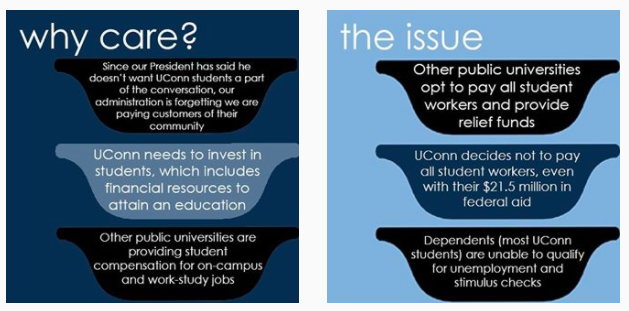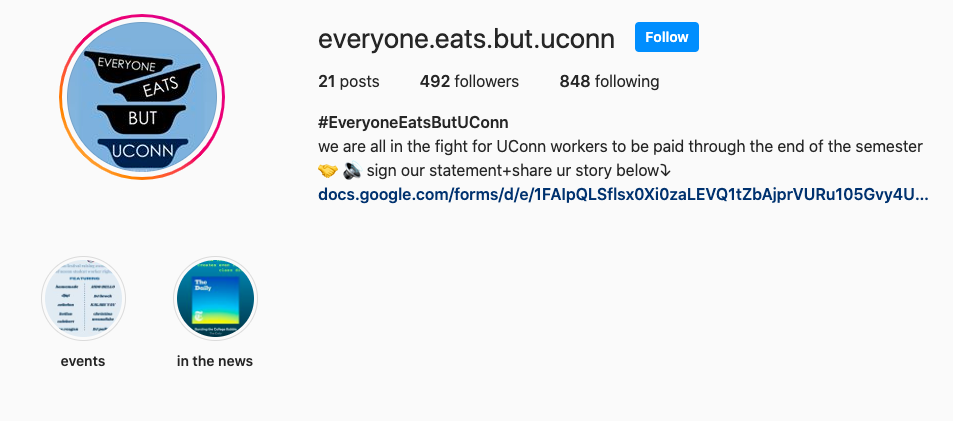Four University of Connecticut students are advocating for student workers to be paid through the end of the Spring 2020 semester, saying they believe President Thomas Katsouleas has failed to uphold the “protect our pack” values that the school champions.
Recent graduates Kylee Dostie and Zoe Jensen, along with seniors Charles Perosino and Shawn Simoneau drafted and sent a letter to Katsouleas earlier this month demanding the UConn Administration to “commit to compensating all student workers for what they would have made for the entire semester had we been on campus.”
“While the University has identified ‘protecting this generation of students from the fiscal impact of the current crisis’ as one of its four fiscal priorities, refusing to pay furloughed student workers is explicitly in opposition to this principle,” their letter states.
UConn spokesperson Stephanie Reitz said in an email that UConn has responded to the student activists on numerous occasions through Katsouleas’s virtual office hours as well as through email conversations.
“…we agree that in an ideal world, it would be right to pay student workers for the hours they expected to work before the COVID-19 crisis,” Katsouleas said in an email sent to Dostie, Perosino and Simoneau on May 11. “It is also right to ensure that with limited resources, those resources go to students experiencing the most hardship.”
To promote their cause, the student activists created the Instagram account @everyone.eats.but.uconn with the hopes of getting Katsouleas and the UConn Administration to recognize them and their concerns listed in their letter.

“Families will not get through this crisis. Workers will not get through this crisis if UConn doesn’t have their back,” Perosino said.
Their letter was released on May 3 and has been signed by nearly 600 people in the UConn community, including the organization UConn PIRG, former Student Body President Priyanka Thakkar and CT State Representatives Robert Sanchez and Anne Hughes.
UConn made it known that student workers would not continue to be paid for regularly scheduled hours in an update on April 1 that said, “…starting on April 6, we are providing guidance for departments to return to standard practice in paying student labor for hours worked.”
But the Connecticut State Colleges and Universities took a different path and committed to paying student workers through the end of the semester, according to a March 25 update. These student activists want UConn to take similar steps.
The letter also calls on UConn to put more of the federal money they received towards emergency aid for students. UConn has set aside $10.7 million of the $21 million they have received under the CARES Act, which calls for at least half of the money to go towards helping students.
“…it is our view that only allocating the bare minimum of funds for student aid runs counter to Husky values; this course of action must be revised so that no students are left behind,” the letter said.
The student activists also want UConn to drop the FAFSA requirement, as this is not a stipulation listed in the CARES Act in order for students to receive emergency grants.
“It is unclear to us why UConn would add barriers to an already-stringent hurdle for students to receive aid,” Perosino said in an email to Reitz, Katsoueleas and members of his cabinet.
Reitz said the FAFSA requirement is a way to ensure that the students who need the emergency money most are able to get it in a timely manner. Information Reitz received on May 21 by Enrollment Planning & Management outlined how this is possible.
“By choosing not to use the FAFSA, we would have needed to require students to provide proof of citizenship, copies of Social Security numbers, selective service registration and many other items that are required proof for Title IV eligibility,” Reitz’s email said. “This would have resulted in significant backlog and delays in delivering emergency grants to students, not to mention a lot [of] work for students also.”
The students behind the letter said many student workers do not qualify for unemployment and by refusing payment for the rest of the semester, UConn is turning its back on an integral part of the community’s workforce.
“We’re the trainers in the Rec Center. We work in the administrative offices. We work in the libraries,” Dostie said. All the more reason to address their concerns, she said.
Dostie is a dining services student worker and said she relies on her wages for groceries and her apartment. When she heard that she and her coworkers would not be receiving pay through the end of the semester, she said it “felt like a punch in the gut to the rest of us.”
The Change.org petition, “Give Dining Services Student Workers Pay During Quarantine”, served as inspiration for Dostie, Perosino and Simoneau to form their own alliance after running the organization Students for Bernie together. They later got in touch with Jensen, former External Affairs Chairperson of Undergraduate Student Government.
“It’s really been a collaborative effort in terms of the Instagram and putting everything together and realizing how we can educate everyone on this issue and signal to Tom Kat and UConn Admin, ‘Hey, we’re here. We’re upset. You need to recognize us,’” Jensen said.


